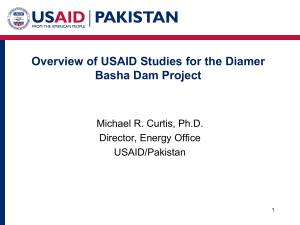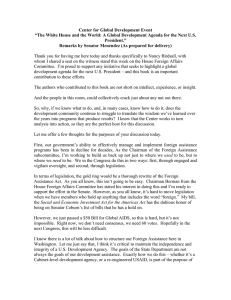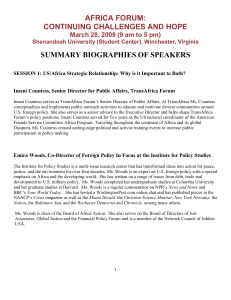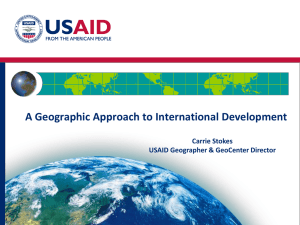Program Overview: Democracy & Governance
advertisement
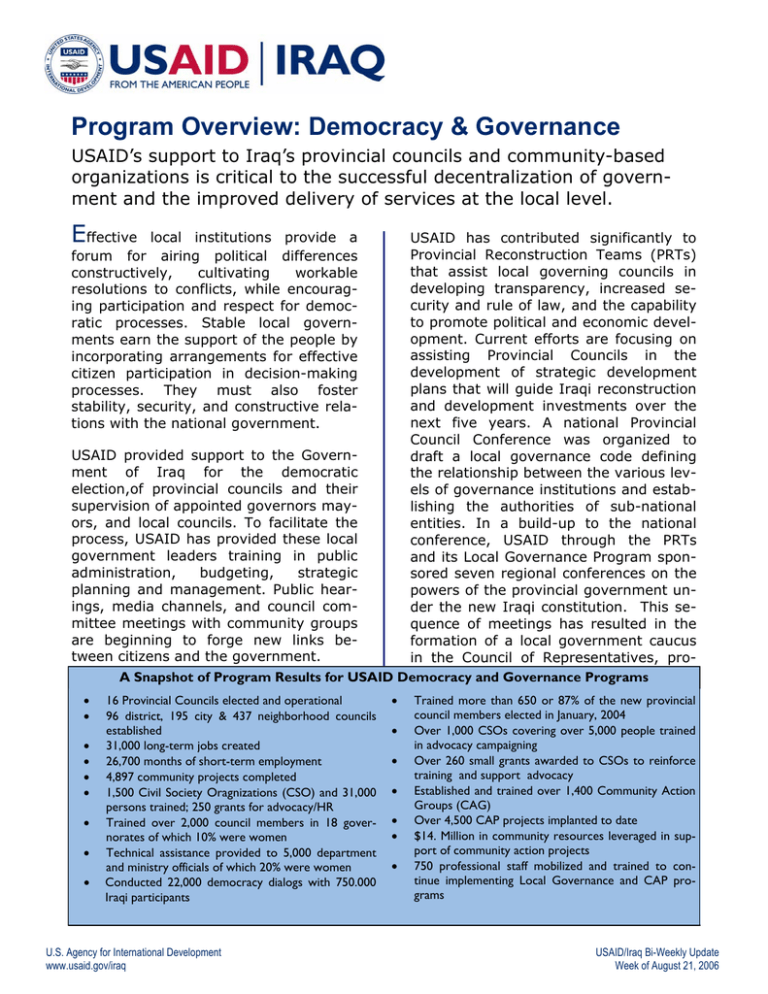
Program Overview: Democracy & Governance USAID’s support to Iraq’s provincial councils and community-based organizations is critical to the successful decentralization of government and the improved delivery of services at the local level. E ffective local institutions provide a forum for airing political differences constructively, cultivating workable resolutions to conflicts, while encouraging participation and respect for democratic processes. Stable local governments earn the support of the people by incorporating arrangements for effective citizen participation in decision-making processes. They must also foster stability, security, and constructive relations with the national government. USAID has contributed significantly to Provincial Reconstruction Teams (PRTs) that assist local governing councils in developing transparency, increased security and rule of law, and the capability to promote political and economic development. Current efforts are focusing on assisting Provincial Councils in the development of strategic development plans that will guide Iraqi reconstruction and development investments over the next five years. A national Provincial Council Conference was organized to USAID provided support to the Governdraft a local governance code defining ment of Iraq for the democratic the relationship between the various levelection,of provincial councils and their els of governance institutions and estabsupervision of appointed governors maylishing the authorities of sub-national ors, and local councils. To facilitate the entities. In a build-up to the national process, USAID has provided these local conference, USAID through the PRTs government leaders training in public and its Local Governance Program sponadministration, budgeting, strategic sored seven regional conferences on the planning and management. Public hearpowers of the provincial government unings, media channels, and council comder the new Iraqi constitution. This semittee meetings with community groups quence of meetings has resulted in the are beginning to forge new links beformation of a local government caucus tween citizens and the government. in the Council of Representatives, proA Snapshot of Program Results for USAID Democracy and Governance Programs • • • • • • • • • 16 Provincial Councils elected and operational 96 district, 195 city & 437 neighborhood councils established 31,000 long-term jobs created 26,700 months of short-term employment 4,897 community projects completed 1,500 Civil Society Oragnizations (CSO) and 31,000 persons trained; 250 grants for advocacy/HR Trained over 2,000 council members in 18 governorates of which 10% were women Technical assistance provided to 5,000 department and ministry officials of which 20% were women Conducted 22,000 democracy dialogs with 750.000 Iraqi participants U.S. Agency for International Development www.usaid.gov/iraq • • • • • • • Trained more than 650 or 87% of the new provincial council members elected in January, 2004 Over 1,000 CSOs covering over 5,000 people trained in advocacy campaigning Over 260 small grants awarded to CSOs to reinforce training and support advocacy Established and trained over 1,400 Community Action Groups (CAG) Over 4,500 CAP projects implanted to date $14. Million in community resources leveraged in support of community action projects 750 professional staff mobilized and trained to continue implementing Local Governance and CAP programs USAID/Iraq Bi-Weekly Update Week of August 21, 2006 vincial agreement on a draft Local Government Code which will be introduced in the Council of Representatives in its next cession and the formation of a local governance association to advocate for changes in current legislation and the introduction of new legislation on behalf of local government institutions at the national level. The Regional Institute of Public Administration in Erbil was expanded and a second institute was established in Basrah. Project Oversight Training provided council officials with skills in project budgeting, management, oversight, implementation and evaluation. Further training will involve strategic planning and working with Civil Society Organizations (CSOs) and Community Action Groups (CAGs) to facilitate greater citizen involvement in local government decision making. CSOs support the productive engagement of the citizenry in consolidating democratic values and processes, with particular emphasis on media, human rights, and anti-corruption. USAID supports the development of CSOs in Iraq through training programs and facilitation of meetings with government officials. For example, the Iraqi Civic Action Network is a group of Iraqi advocacy group concerned with issues such as child welfare, citizenship, domestic violence, education, and employment law. ICAN has conducted numerous meetings with high level officials to discuss such issues as well as legislation concerning them. Budding social advocates have been provided training such as Message Development Training and Advanced Advocacy Training to build upon proven abilities of organization and advocacy. The trainings have imparted skills such U.S. Agency for International Development www.usaid.gov/iraq as fund raising and event planning in order to help issue advocates to transition from marshalling resources from individuals to promoting larger scale legislative action to obtain long-term funding and support. USAID’s Iraq Civil Society and Media Program supports independent media through skill development training and business development assistance to various media outlets. The National Iraqi News Agency (NINA) was provided with the latest technology and training bringing them up to international editing and reporting standards. NINA strives to be a voice of fair and reliable reporting in Iraq. Media law advocacy is guided towards establishing a legal environment supportive of independent media. CAGs establish local priorities, design projects to address those priorities, and identify local resources to leverage public investments to implement the projects. USAID’s Community Action Program is a grass-roots community development program that instills the confidence and self-reliance necessary to help a community meet its own needs. USAID has established and trained CAGs that consist of community leaders who learn to conduct meetings identify community needs, and manage projects. They are encouraged to work with local government and often share the cost burden or donate labor to the project. Communities across Iraq are not only improving their daily lives, but learning to achieve their goals by utilizing democratic tools. The program provides water systems, roads, schools, clinics, and other priorities. Procurement for the projects occurs locally which pumps millions of dollars into local economies in all 18 governorates. The projects create short and long-term jobs and mitigate USAID/Iraq Bi-Weekly Update Week of August 21, 2006 conflict by empowering people across gender, ethnic, tribal, and religious lines and include repair to local infrastructure, income generation activities, providing assistance to victims of military action, and supporting social mobilization By empowering community organizations to hold local government accountable, USAID is strengthening the efficiency, responsiveness, transparency, and accountability of local governments throughout Iraq. Participation and the success of local governing institutions diminishes the “winner take all syndrome” prevalent in societies unaccustomed to democratic processes. U.S. Agency for International Development www.usaid.gov/iraq USAID/Iraq Bi-Weekly Update Week of August 21, 2006





